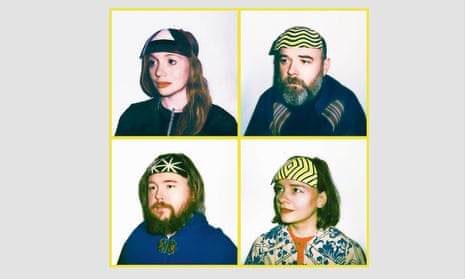It is about halfway through our video chat that Trouble turns up. While Hen Ogledd officially comprise Dawn Bothwell, Rhodri Davies, Richard Dawson and Sally Pilkington, today it also includes the latter couple’s excellently named cat. Trouble, “with a capital T”, as the wildly catchy chorus of their recent single goes, is as playfully unwieldy as the group. Although we are here to chat about new album Free Humans – a joyous constellation of “wonky” pop, free improvisation and sci-fi musing – it’s hard to stay focused. “Sorry,” says Dawson at one point, “I’m a bit distracted by the cat arsehole in my face!”
Dawson formed Hen Ogledd with Davies as a cathartically noisy improvisation duo in 2012, around the time that his own solo work was starting to reach a rapidly growing audience, leading to a string of acclaimed albums including last year’s opus, 2020. Meanwhile, Hen Ogledd expanded to include Bothwell for 2016’s Bronze, before Pilkington cemented the current lineup with 2018’s Mogic, their first on Domino Records.
The group have managed to balance a freeform approach to music-making with an increasing range of pop melodies and song structures, but make it clear that their vision of the genre is “multifarious”. “There is a definite level of wonkiness,” says Pilkington, “and fun is a big factor in the kind of pop that I like to make.” Influences on the album range from Abba and Billie Eilish to 12th-century composer Hildegard von Bingen, while the lyrics keep pace with such weirdness. As Bothwell jokes: “We decided to pick the most popular themes, typical stuff like sewers and the surfaces of other planets.” Something about the spirit and shared connection of the band give the whirling parts a gloriously odd cohesion.
A key part of this is the distinctive singing of all four members, delivered in various Scottish, Welsh and northern English accents – after all, Hen Ogledd is Welsh for the Old North – along with swathes of vocoder. Many of the album’s best hooks came from exploring the limits of traditional vocal range, as Dawson explains: “It’s that area where you’re on the fringes of what you can actually do, where you’re absolutely out in the wilderness. It’s a really nice place to operate.”
For Davies, this ethos of shared speculation is integral to Hen Ogledd in a wider way. “We’re looking at alternative ways of doing stuff, of being together and making music, and that involves imagining future possibilities.” Bothwell nods: “The problem that we have currently is that you almost can’t see beyond all of the crappiness. So it’s important, isn’t it, to think past that?”
If it does take an out-there pop album to help us consider such questions, then Hen Ogledd are certainly a great choice as guides: four Free Humans, plus a troublesome cat.
Free Humans is out now

Comments (…)
Sign in or create your Guardian account to join the discussion